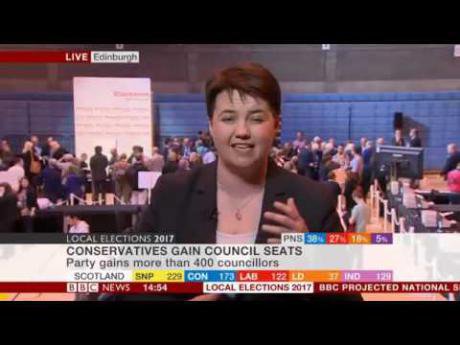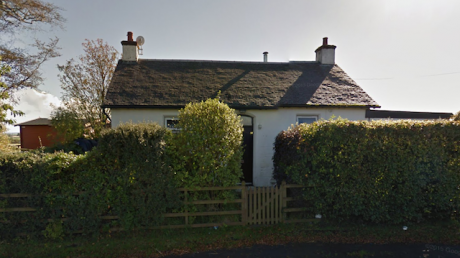
Ruth Davidson, BBC, fair use
The latest projections show the Conservatives winning up to ten seats in Scotland on Thursday. That’s ten times more than they’ve won at any point in the last 25 years – and as the polls currently stand, it could be enough to decide the UK-wide election result this Thursday.
This Tory surge hasn’t come from nowhere: last year’s Scottish parliament election saw Ruth Davidson’s party more than double its number of seats. But new revelations today cast a shadow over that success. While the new Tory gains in Scotland are often put down to Ruth Davidson’s charisma, or to a polarisation on the independence question, this simple fact is often ignored: households in Scotland are being flooded with Conservative propaganda in a way they never have never been before. And it is unclear who is bankrolling it.
Where did the Scottish Conservatives get all of this extra cash?
Tory election spending in Scotland has more than trebled in five years. In the 2011 Scottish parliament election, the Tories spent nearly £275,000. In the 2016 election, they splashed out £978,921.07: more than three and a half times as much.
It should be easy to find out where all this money has come from. Thanks to the laws of the United Kingdom, any donation over £7,500 has to be registered and the source of the donation named. So: a search of the Electoral Commission website should easily provide the answer of who has been paying for this unprecedented Tory spending spree. Except that it doesn’t.
Partly, this seems to be because most of the donations come through the UK-wide office. But partly, it’s because a significant amount of the cash seems to have come through obscure trusts and unincorporated associations.
Looking only at the year running up to the Holyrood vote last year, here are some examples of what we found.
The Irvine Unionist Club
In April 2016, a group called the Irvine Unionist Club gave the North Ayrshire Conservative and Unionist Association £100,000. In order for a group like the Irvine Unionist Club – an Unincorporated Association – to give a donation of more than £25,000, it has to be legally registered with the Electoral Commission, and declare any donations to it of more than £7,500. The Irvine Unionist Club doesn’t seem to appear on the list of registered donors, and Googling it reveals almost nothing, meaning that we don’t know where their money came from.
openDemocracy visited the registered address of the Irvine Unionist Club – a cottage in rural Ayrshire. We were informed that the Club no longer exists, but that its former treasurer, David Belding, does indeed live there. Belding himself was out, and is yet to answer his phone to us.

The registered address of the Irvine Unionist Club.
The treasurer of the North Ayrshire Conservatives (and former Scotland rugby player) Bryan Gossman, did pick up the phone, though. He told us that the money had come to them because the trust was being wound down, and that most had in fact gone to the “central party in Edinburgh”. He admitted he didn’t check the true original source of the cash, but believed that they had it because they had sold a building a number of years earlier.
In light of what appears to be a failure to comply with the requirement of the 2009 Elections Act to register as a donor, openDemocracy reported this donation to the Electoral Commission, who said:
“Political parties and their accounting units are legally required to report donations that they receive over a certain threshold. In this case, the accounting unit has met its obligations. As an Unincorporated Association, the donor should have applied to register with the Commission when making the donation. The Commission is establishing the facts before determining what further steps to take.”
openDemocracy asked the Scottish Conservatives why it had accepted a donation from an unregistered group; why the donation was registered as going to the local party when the local party treasurer claims it actually went to the central party in Edinburgh, what the original source of the money was, and what checks were put in place to ensure that it came from a legal source. The party has yet to reply to our questions.
Scottish Conservative Club
The Scottish Conservative Club appears twice in the Electoral Commission’s register of donors. It gave a donation of £25,000 in September 2015 and a further donation of £20,000 in January 2016. The trust is listed at an Edinburgh address which appears to belong to Blackadders solicitors. However, like the Irvine Unionist Club, it doesn’t appear on the register of Unincorporated Associations, because this is only required of those who make donations over £25,000 over the course of a calendar year: which it managed to avoid by paying its two donations (one at the limit) on either side of New Year.
openDemocracy asked the Scottish Conservatives where the Scottish Conservative Club got its money from. The party has yet to reply to our questions.
There is no suggestion that any law was broken in this case.
The Scottish Unionist Association Trust
In the year before the Holyrood vote, local Conservative branches across Scotland received eight separate donations worth a total of £28,083.49 from the Scottish Unionist Association Trust. Electoral Commission records show the trust at an address in Glasgow which it appears to share with the Glasgow Conservatives.
openDemocracy asked the Scottish Conservatives about the Scottish Unionist Association Trust. They haven’t replied to our questions.
There is no suggestion that any law was broken in this case.
Focus on Scotland
Focus on Scotland gave £130,000 to the Scottish Conservatives shortly after the 2015 general election. Unlike the other groups, it is a legally registered unincorporated association, with an address in Glasgow. When openDemocracy visited this building, it turned out to belong to JS Harvie and Co – a building firm owned by Sir Jack Harvie, a prominent Scottish businessman and Tory donor. We do not know, though, where, or from whom, Focus on Scotland gets its money. Jack Harvie was unavailable for comment.
openDemocracy asked the Scottish Tories who Focus on Scotland are and where they get their money from. The party hasn’t answered our questions.
There is no suggestion that any law was broken in this case.
“Corrupt practices and the rumour mill”
The above donations alone add up to roughly a quarter of the Scottish Conservatives’ election spending in the year before the 2016 election, leaving Ruth Davidson with a simple question to answer: where does the money really come from?
Commenting on openDemocracy’s findings, Steve Goodrich of Transparency International said: “Transparency over political donations is an essential part of our democratic process. Without it corrupt practices and the rumour mill are left to thrive.”
Alexandra Runswick, Director of Unlock Democracy, said: “Secrecy around political donations inevitably gives rise to the impression that donors are trying to use their deep pockets to buy influence over parties and the policymaking process. While money shouldn’t distort our democratic processes, it currently does”.
Democracy depends on transparency. Unless voters know who is funding their politicians, how can they assess whether they are bending to the interests of those who are bankrolling them? Unless we have a clear idea of who funds the leaflets coming through our letterboxes and the Facebook adverts telling us who to vote for, why should we read them? openDemocracy has raised these issues with the Electoral Commission. We will continue to investigate and report our findings.
Read more: how Dark Money is drowning British democracy
Read more
Get our weekly email
Comments
We encourage anyone to comment, please consult the oD commenting guidelines if you have any questions.